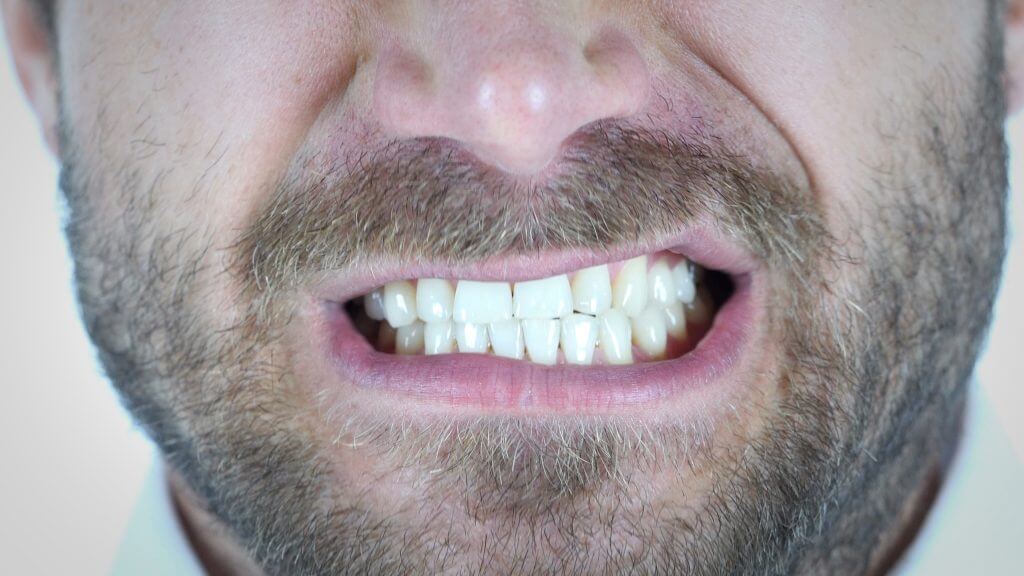In the heart of the city we have some of the highest rates of bruxism in the UK. Bruxism is a habit that can involve one of or a combination of jaw clenching and teeth grinding. It can happen to both adults and children, although it is most common in adults between 25-44 years old. Most people will grind or clench their teeth at some point during their life time.
Bruxism is any type of teeth grinding or jaw clenching and is completely unrelated to normal functions such as eating and talking. If you are a jaw clencher you are more likely to do so during the day, usually as a reaction to stress. If you instead are a teeth grinder it is usually a habit carried out during the night and you might well get to know about it first from a sleep-deprived spouse or partner complaining of the grinding noises during the night. But please note that it can also be silent, leaving you completely unaware of this bad habit.
Bruxism symptoms
Bruxism can have many signs and symptoms including:
- Headaches, particularly in the morning or at the end of a hard day
- Overdeveloped jaw muscles and a square shaped face
- Ear pain (because of the jaw jointís proximity to the inner ear)
- Trouble sleeping (insomnia)
- Sore jaw or full-blown TMJ disorder
- Chipped or worn down teeth sometimes with tooth sensitivity (to hot, cold or sweet)
- Anxiety & tension
- Neck and upper back pain
- Cracked fillings or teeth
What causes bruxism?
There is a link between sleep bruxism and OSA (obstructive sleep apnea) as well as sleep talking and other difficulties or disorders during sleep. However, it is more commonly related to stress and anxiety. In one study over 70% of sleep bruxists (grinders) related their involuntary habit to stress and/or anxiety. It is also more common in people who frequently use alcohol, tobacco and caffeine. People with missing teeth or misaligned teeth can sometimes have more of a tendency to clench or grind being that their bite is not balanced.
Teeth grinding problems
The wear on your teeth can be quite significant if the habit has been going on for a long period of time and the teeth haven’t been protected. Teeth enamel can wear down to the underlying layer of denting, a softer and more vulnerable layer which is more susceptible to be both further tooth wear, sensitivity and decay. If you think you are a bruxist or are suffering from tooth wear, it is so important to see your dentist as advanced, long term tooth can be very complex to restore if the teeth become short and stump-like. Prevention is the key so be sure to protect your teeth and dental health.
Grinding or clenching teeth has also been linked to more acute problems such as cracked or fractured teeth which can be very painful. If you have porcelain crowns or veneers it is highly recommended to wear a night guard not only to protect the teeth in the opposite jaw from excess wear, but also to prevent the porcelain itself from cracking.
Headaches, jaw pain, ear ache and muscular pains connected with bruxism can be very debilitating and disruptive to ones life. Bruxism can be managed to make your life more comfortable, so if you are worried, don’t struggle, get in touch with an understanding team who will be more than happy to help you.
How to stop grinding your teeth
The key to managing your bruxism is seeing a dentist to ensure a correct diagnosis and understanding the cause of your bruxism. The dentist will help you manage any of you pains and symptoms and also help to ensure the long term protection and health of your teeth, jaws and muscles with a treatment plan bespoke for you and your needs. Your plan may include:
- Mouth splints or guards. These are made from a hard acrylic material and can vary in design and shape to suit you. They are made to protect the teeth and to allow jaw and muscles to relax.
- Muscle relaxation.Very often bruxism have over developed, and tender muscles, with frequent pain and headaches. This can be significantly improved by using either muscle relaxing injections or laser therapy. This can have a huge impact on those who struggle with regular tension headaches and migraines or find their face has become unaesthetically square shaped due to the overdeveloped muscles.
- Dental rehabilitation.In cases where the misalignment of teeth or where there are missing teeth in areas of the mouth it is advisable to seek the advice of a Dentist to determine whether balancing your bite and replacing missing teeth would help.
A few lifestyle choices you can make to help you stop grinding your teeth:
- Reduce stress. Listening to music, taking a warm bath or exercising can help you relax and may reduce your risk of developing bruxism. Consider meditation or yoga to help you switch off in the evenings.
- Avoid stimulating substances in the evening. Don’t drink caffeine after dinner and avoid alcohol during the evening, as they may worsen bruxism.
- Practice good sleep habits. Getting a good night’s sleep, which may include treatment for sleep problems. Try and get into a regular routine and get 8 hours sleep a night.
- Avoid chewing gum for long periods. This stimulates the muscle contraction connected to clenching and exacerbates the habit.
- Talk to your sleep partner. If you have a sleeping partner, ask him or her to be aware of any grinding or clicking sounds that you might make while sleeping so you can report this to your dentist or doctor.
- Schedule regular dental exams. Dental exams are the best way to identify bruxism. Your dentist can spot signs of bruxism in your mouth and jaw during regular visits and exams.
Bruxism Treatment in London
Why not give us a call now for more about bruxism on 0207 377 6762 or drop us an email at [email protected] to discuss bruxism symptoms and treatments with one of our friendly staff.
Book in for your dentist appointment in Liverpool Street where you can talk to our dentists about any concerns you may have. You can book online via our contact form for bruxism treatment in London or call us today.
Booking an Appointment is Easy at Bishopsgate
We are known for providing our London patients with premium dental care, personalised appointments, and some of the area’s finest dental practitioners. We open our doors at 8am every weekday, and close for the day at 5pm or later. You can book online or call our friendly team on 0207 377 6762.
We look forward to providing you with an impeccable dental experience.






